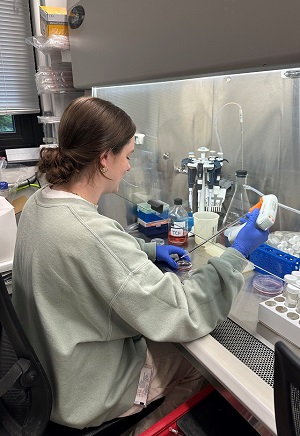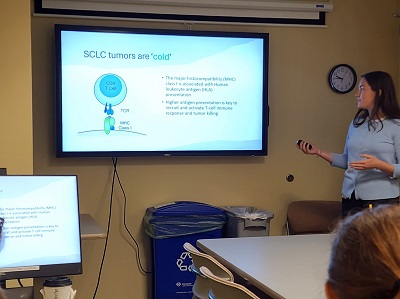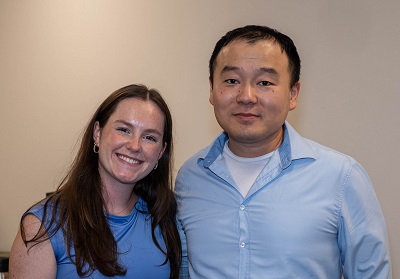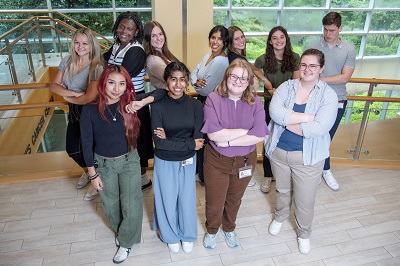
Trusting Your Path
June 13, 2024
Hi! My name is Anna Duffy and I am a rising junior at the University of Delaware. I am studying Biological Sciences with a concentration in Cell and Molecular Biology and Genetics and have minors in Genetic Counseling and Women and Gender Studies. I am interested in a career in research, specifically studying genetic diseases and treatment. At the end of the fall semester of my sophomore year, I, at the last minute, decided to attend a required Discovery Day at Fox Chase Cancer Center for a summer research program. At that moment, I thought why wouldn’t I spend a day at a research center to see where my internal interests become existent? The visit to the center was an essential piece of seeing my career goals become tangible. I had not considered the chance that a few months later, upon reviewing my application, I would be accepted to the program and assigned to a research lab at the center.
Previously, I had minimal experience working in a lab. Before the start of the fellowship, I was nervous about the fast-paced instruction and technical work I was about to embark on. However, after re-evaluating the future summer I would spend in Philadelphia alongside 11 other students, I thought of the monumental knowledge and valuable experience I would gain working with esteemed cancer research professionals.
I soon came to find myself deeply enjoying the first week of the fellowship. Led by Dr. Leystra and Dr. Purdy, academic professors at Fox Chase, the group of us were taught intensive laboratory techniques and concepts in cancer. We spent the week being introduced to reading scientific papers, cancer biology, and research practices to study these cancers. Although it was challenging, the week exceeded my expectations, and I found it highly rewarding to engage in topics I found so interesting. Beginning my time at Fox Chase beside talented scientists and passionate students set me up for the next weeks I would be at the center.
This summer, I will be under the mentorship of PhD student Xinpei Jiang in Dr. Cañadas’ lab and will soon begin my project conducting research in small-cell lung cancer immunotherapy treatment. I will be working with a specific gene, Menin, and analyzing its effects on antigen presentation in tumor cells. I am grateful to be surrounded by such a supportive group of mentees and fellows that I can rely on for assistance and encouragement in the development of my project and throughout this fellowship. I am looking forward to gaining insights into cancer research, growing connections with other passionate scientists, and learning valuable lessons from lab experience.
Building My Future
July 11, 2024
 Currently, I am working in Dr. Israel Canadas’ lab, under the mentorship of PhD candidate, Xinpei Jiang. It has been a pleasure to be a part of an esteemed lab, working along such talented and dedicated scientists. The past month I have learned so many invaluable lessons and techniques. My mentor, Xinpei, has taught me many laboratory skills that I have been utilizing and improving on each week. He always encourages me to ask questions to deepen my understanding of cancer research topics and cellular biology and fill in the gaps of my knowledge. I have not received one-on-one mentorship before this program and it has proven so beneficial to my comprehension of biological systems and pathways and cancer research protocol.
Currently, I am working in Dr. Israel Canadas’ lab, under the mentorship of PhD candidate, Xinpei Jiang. It has been a pleasure to be a part of an esteemed lab, working along such talented and dedicated scientists. The past month I have learned so many invaluable lessons and techniques. My mentor, Xinpei, has taught me many laboratory skills that I have been utilizing and improving on each week. He always encourages me to ask questions to deepen my understanding of cancer research topics and cellular biology and fill in the gaps of my knowledge. I have not received one-on-one mentorship before this program and it has proven so beneficial to my comprehension of biological systems and pathways and cancer research protocol.
Our lab focuses on the small cell lung cancer tumor microenvironment. To improve a patient's responses to immunotherapy we must look deeper into why and how a tumor functions. Utilizing CRISPRCas-9 technology, my lab previously discovered a gene, MEN1, to play a crucial role in the antigen expression of tumors. My project revolves around validating these results by altering the cell genome to increase antigen presentation and improve immune response. It is fascinating to be a part of such a specific project on small cell lung cancer research and I am grateful for the time, mentorship, and commitment this program has provided me thus far.
 It is hard to believe that I am almost halfway done with my fellowship here at Fox Chase. In the past month, I have learned so much: everything from ameliorating my laboratory techniques to learning crucial life lessons. My mentor, PI, and program directors’ experiences have compelled me to pursue research in the future. It is significant to recognize that this program has not only allowed me to get hands-on research in a distinguishable cancer research institution, but also has connected with scientific professionals that were once in my shoes. The insight that I have gained as well as the encouragement to create and follow my own path will stick with me far longer than any scientific knowledge.
It is hard to believe that I am almost halfway done with my fellowship here at Fox Chase. In the past month, I have learned so much: everything from ameliorating my laboratory techniques to learning crucial life lessons. My mentor, PI, and program directors’ experiences have compelled me to pursue research in the future. It is significant to recognize that this program has not only allowed me to get hands-on research in a distinguishable cancer research institution, but also has connected with scientific professionals that were once in my shoes. The insight that I have gained as well as the encouragement to create and follow my own path will stick with me far longer than any scientific knowledge.
Wrapping up at Fox Chase
August 24, 2024
 I had so highly anticipated this summer, it is hard to believe that I am writing this at the end of the 11 weeks. Over the last few weeks, the program intensified as I was scrambling to collect data and organize my presentation. However, in the final weeks, although it was the height of the program, I really got to see how far I had come from the beginning. Of course, it is easy to doubt yourself when you are trying something completely new and out of your comfort zone. It was common for me to have self-doubt when my data didn’t exactly line up or when I would continuously not achieve clear Western blots.
I had so highly anticipated this summer, it is hard to believe that I am writing this at the end of the 11 weeks. Over the last few weeks, the program intensified as I was scrambling to collect data and organize my presentation. However, in the final weeks, although it was the height of the program, I really got to see how far I had come from the beginning. Of course, it is easy to doubt yourself when you are trying something completely new and out of your comfort zone. It was common for me to have self-doubt when my data didn’t exactly line up or when I would continuously not achieve clear Western blots.
In the last few weeks, the work I was doing held more room for error. I wasn’t simply reading papers or discussing the basics of research and bench work with Xinpei or Dr. Purdy. Instead, I came into the lab with a task at hand and worked independently to complete it. Most days were busy and I would spend a majority of my time in the cell culture room pipetting various media and liquids all to achieve a specific result. I had a deeper understanding of the cell culture work and data I expected to see and had collected enough results to actually be able to analyze them. Over the course of August, I ran many Western blots (all of which a few were successful) and I took on a deeper understanding of my data using flow cytometry.
When it was time to present our presentation drafts, I felt slightly underconfident in the work I had produced and felt like I hadn’t achieved as much as I had hoped. This mentality was definitely a challenge I had to overcome. In attempts to revise my way of thinking, I inquired about how my fellow peers' experiences were going and how they felt about the upcoming conclusion to the program. I was relieved to hear that most of them were in the same position as I and felt weary of the nearing final symposium. This feeling of comfort swept over me. I wasn’t alone. I had 11 other people who were all in the same boat as me. I was able to discuss my project with them and get to know their lab’s as much as mine. Most of us felt anxious with an increasing deadline, but, as I saw it, most of us felt connected to our labs and overall positive about our summers.
One of the best aspects about this program was by far the people. If I attended Fox Chase everyday not being able to knock on the door across the hall to overlook what another fellow was doing for the day or eat lunch with the other fellows, this program would not have been what it was. When the final symposium rolled around, I didn’t feel as worried as I thought.  I knew that we had built so much knowledge and success in the weeks we had been here and whether we obtained the expected data or not, we had made it. I knew that I would be overjoyed to see each of my peers speak to their families and labmates about their unique summer experiences.
I knew that we had built so much knowledge and success in the weeks we had been here and whether we obtained the expected data or not, we had made it. I knew that I would be overjoyed to see each of my peers speak to their families and labmates about their unique summer experiences.
Overall, this summer was an education in cancer, research, and, more importantly, myself. I learned my weaknesses and strengths when it comes to dealing with failure and how to redirect your goals when obstacles inevitably arise. I will look back on this summer fondly and recognize all my growth and accomplishments because of the people that helped me get there.